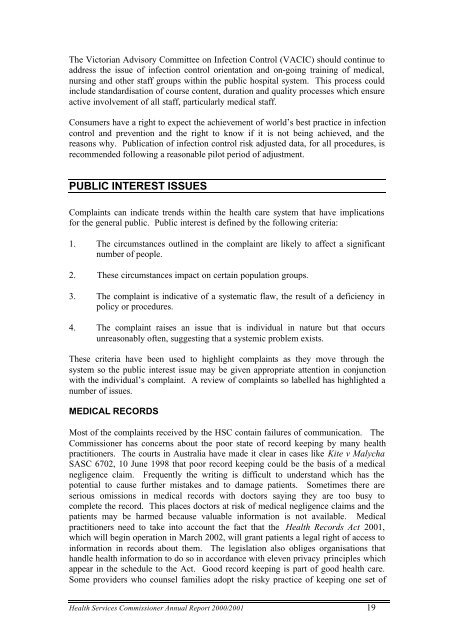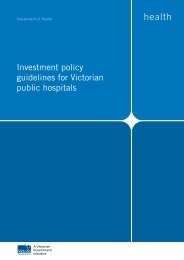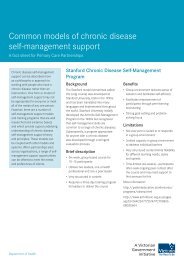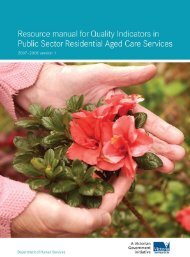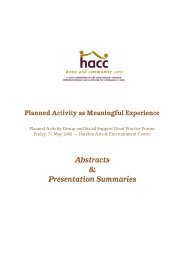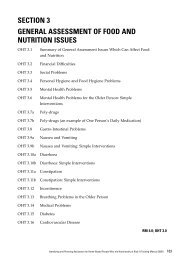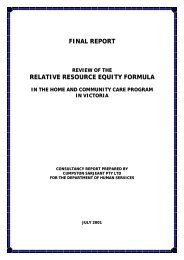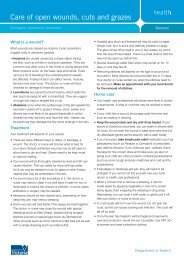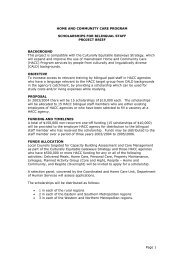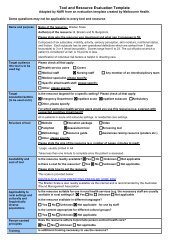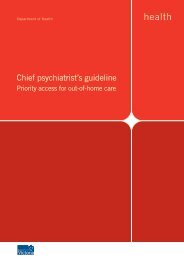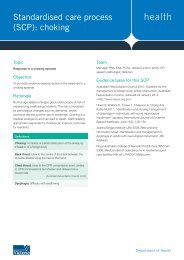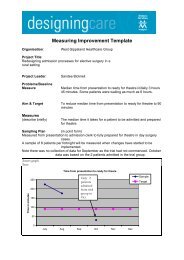Health Services Commissioner Annual Report 2000/2001
Health Services Commissioner Annual Report 2000/2001
Health Services Commissioner Annual Report 2000/2001
Create successful ePaper yourself
Turn your PDF publications into a flip-book with our unique Google optimized e-Paper software.
The Victorian Advisory Committee on Infection Control (VACIC) should continue to<br />
address the issue of infection control orientation and on-going training of medical,<br />
nursing and other staff groups within the public hospital system. This process could<br />
include standardisation of course content, duration and quality processes which ensure<br />
active involvement of all staff, particularly medical staff.<br />
Consumers have a right to expect the achievement of world’s best practice in infection<br />
control and prevention and the right to know if it is not being achieved, and the<br />
reasons why. Publication of infection control risk adjusted data, for all procedures, is<br />
recommended following a reasonable pilot period of adjustment.<br />
PUBLIC INTEREST ISSUES<br />
Complaints can indicate trends within the health care system that have implications<br />
for the general public. Public interest is defined by the following criteria:<br />
1. The circumstances outlined in the complaint are likely to affect a significant<br />
number of people.<br />
2. These circumstances impact on certain population groups.<br />
3. The complaint is indicative of a systematic flaw, the result of a deficiency in<br />
policy or procedures.<br />
4. The complaint raises an issue that is individual in nature but that occurs<br />
unreasonably often, suggesting that a systemic problem exists.<br />
These criteria have been used to highlight complaints as they move through the<br />
system so the public interest issue may be given appropriate attention in conjunction<br />
with the individual’s complaint. A review of complaints so labelled has highlighted a<br />
number of issues.<br />
MEDICAL RECORDS<br />
Most of the complaints received by the HSC contain failures of communication. The<br />
<strong>Commissioner</strong> has concerns about the poor state of record keeping by many health<br />
practitioners. The courts in Australia have made it clear in cases like Kite v Malycha<br />
SASC 6702, 10 June 1998 that poor record keeping could be the basis of a medical<br />
negligence claim. Frequently the writing is difficult to understand which has the<br />
potential to cause further mistakes and to damage patients. Sometimes there are<br />
serious omissions in medical records with doctors saying they are too busy to<br />
complete the record. This places doctors at risk of medical negligence claims and the<br />
patients may be harmed because valuable information is not available. Medical<br />
practitioners need to take into account the fact that the <strong>Health</strong> Records Act <strong>2001</strong>,<br />
which will begin operation in March 2002, will grant patients a legal right of access to<br />
information in records about them. The legislation also obliges organisations that<br />
handle health information to do so in accordance with eleven privacy principles which<br />
appear in the schedule to the Act. Good record keeping is part of good health care.<br />
Some providers who counsel families adopt the risky practice of keeping one set of<br />
<strong>Health</strong> <strong>Services</strong> <strong>Commissioner</strong> <strong>Annual</strong> <strong>Report</strong> <strong>2000</strong>/<strong>2001</strong> 19


